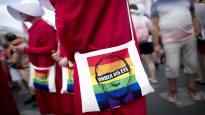The tightening of the so-called gay propaganda law, approved by the Russian Duma in November, entered into force on December 1.
In the past, talking about sexual and gender minority jobs – at least in a positive spirit – was forbidden to minors. Now, according to Russian law, “gay propaganda” cannot be published to anyone, regardless of age.
The tightened propaganda law and Russia’s attack on Ukraine have been the last straw for many members of the minority, and emigration has accelerated.
Forty-year-old Aleksei also left his home country and is now building a new, freer life in Southwestern Europe.
Aleksei does not appear in the story with his last name, because he fears for his own safety and that of his loved ones in Russia. His background and whereabouts are known to .
Human rights activist Valentina Lihoshvan according to which life is not safe for a minority in Russia. The future looks bleak in his opinion.
– The first law that came into force in December practically forbids thinking, Lihoshva downloads.
Lihoshva remembers the times when there was no fear of belonging to minorities in Russia.
– People were actually indifferent towards the LGBTI community. It didn’t matter to them. I remember those times.
According to Lihosva, many did not take the gay propaganda law that came into force ten years ago very seriously. However, the change is now clearly visible in Russian society.
– However, the law seriously affects the masses through the media and television. It incites hatred towards the LGBTI community, says Lihoshva in a telephone interview from Moscow.
Lihoshva works in the community of LGBTI people. It has not been an official organization for years, because registration as an official organization was made illegal or at least impossible. Today, Russians call their organizations community or “initiative groups”.
“Propaganda about pedophilia and gender reassignment” was also banned
With the tightening of the law, “propaganda about pedophilia and gender reassignment” was also banned in Russia from the beginning of December.
Chairman of the Russian State Duma Vyacheslav Volodin said on Telegram on November 24, 2022 that the new legal package is intended to “protect our children and our country from the darkness spread by the United States and European countries”.
Mentioning an LGBTI issue, pedophilia or gender reassignment can result in fines of up to ten million rubles, or around 170,000 euros.
According to Valentina Lihoshva, it is not yet known how the organization she represents can operate from now on or whether the tightened law will directly affect activists.
– At least it affects publishing houses, writers and editors, photographers and artists. To a wide range of people. There is still no information on how the law will be interpreted. It will probably be resolved within half a year.
Aleksei’s work as a teacher was considered propaganda
Aleksei, who himself has participated in the activities of human rights organizations for years, now has to use his savings to start a new life in a new country.
In Russia, he worked as a cultural professional and teacher, but problems arose at the workplace.
Teaching was not considered suitable for him because he belongs to a sexual minority. Aleksei’s work as a teacher could be considered gay propaganda.
– I experienced pressure in my work, especially when I worked with children, Aleksei says
Currently, he has some projects for which he gets paid. Adapting to a new country requires time and work.
– But I’m trying to adapt, I’m applying for asylum, I’m learning the language and I’m looking for a job. My savings are limited and will run out at some point.
Aleksei’s only asset is a car, which he tries to sell to finance his life.
“The number of hate crimes has increased”
The number of hate crimes has increased with the propaganda law in Russia, according to some researchers, says Valentina Lihoshvan. In his opinion, hate crimes are aggressive acts against the LGBTI community provoked by the state.
Migration has been noticed in the LGBTI community for a long time, he says.
– We move from small cities to big ones, mainly Moscow and St. Petersburg. In big cities, you can hide and define your own circle of life, live with your own friends and acquaintances. No need to be on display.
Lihoshva does not want to say where the organization gets its funding from or who pays him a salary.
He cannot tell about the funding, probably because according to Russian laws, funding from abroad is prohibited, among other things. People or organizations that receive funding from abroad can be declared foreign agents. That would make things even more difficult.
Financing “undesirable organizations” can get you to prison for a maximum of five years, says Lihoshva. Consequently, funders of LGBTI communities will certainly want to stay out of the public eye.
Human rights organizations are under pressure
Over the years, there have been threatening messages on social media, counter-demonstrations, violence and threats of violence, attacks, even death threats and even killings towards LGTBI minorities in Russia, says Lihoshva.
He himself has experienced threats and made requests for an investigation to the police.
– The Russian authorities did not see the hallmarks of a crime in the threats.
The “Homopropaganda Law” came into force in Russia in 2013, i.e. the strict times have been in effect for ten years. Writing about sexual and gender minorities was already prohibited under threat of a fine if the publication could be seen by a minor, i.e. under the age of 18.
In the 2010s, other laws were enacted in Russia that have oppressed civil society. Being declared a foreign agent has made it difficult for organizations to operate and exist. Now in the 2020s, the situation is getting even tighter.
You can discuss the topic until Friday 2 December. until 11 p.m.
